Brass is the best option among the materials faucets are made of. Faucets made of Brass are a wise choice since all-brass faucet bodies are durable and uncommon to rust or leak. They are renowned for their flawless surface, density, and durability.
If you are looking to buy a new kitchen faucet and want to know what material is best for you, then this article will help you.
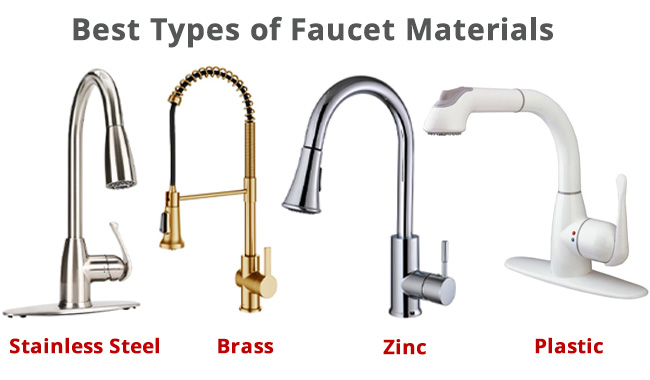
4 Best Types of Faucet Materials (with pros and cons)
1. Brass Faucets
A metal alloy called Brass mostly consists of copper and zinc. Small amounts of additional metals are also incorporated to add new qualities or improve already existing ones.
It is the most durable and most dense material for kitchen faucets. Additionally, they are prone to corrode or leak compared to other materials. Although they may cost a little more, their longevity justifies the additional cost.
Pros
- Resistant to corrosion and leaks
- It has a smooth texture
- More dense compared to other materials
- Durable and will last many years
- Can withstand heavy use, wear and tear
Cons
- It is quite expensive
2. Stainless Steel Faucets
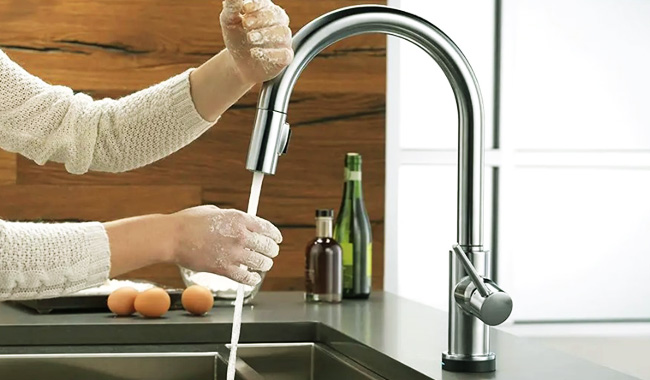
Steel is an iron-based metallic composition with a small amount of carbon added for reinforcement. Among the materials that may be used for a tap, stainless steel is one of the most adaptable.
In addition to being somewhat cheaper than solid Brass, stainless steel is a terrific choice if you’re extremely worried about mercury because these faucets are completely free of mercury.
But, do keep in mind that stainless steel faucets often don’t survive any further than a decent brass model faucet, and inexpensive faucets are more likely to corrode.
Pros
- Less expensive than Brass
- Completely free of lead
- Quite strong considering the price
- Has a shiny aesthetic look
- It can be incorporated with different finishes
Cons
- It can be easily scratched
3. Zinc Faucets
Zinc is one of the cheapest materials available for kitchen faucets. ZAMAK, a series of alloys having copper, aluminum, magnesium, and zinc as alloying constituents, is used to make zinc faucets.
These faucets are made to be less expensive than brass faucets yet retain the highly corrosive properties of Brass. Due to its affordable pricing, it is a fantastic choice for the thrifty bathroom remodel.
PS. When it comes to choosing a kitchen faucet, like faucet materials, there are lots of things you must need to consider. To know them in detail, click here.
Pros
- Pretty inexpensive
- A huge number of available designs
- They can have other metals coated on them
- Rust Proof design
Cons
- Not as durable as other materials
4. Plastic Faucets
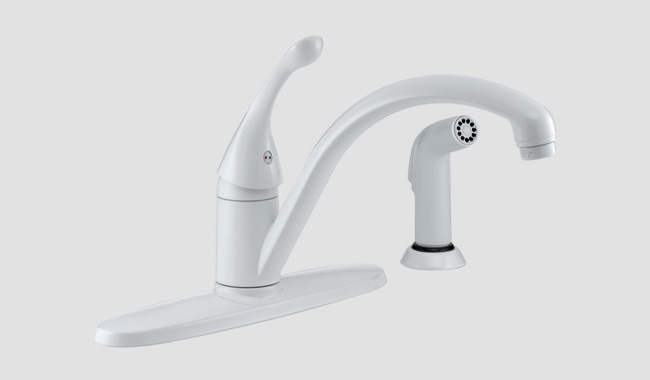
The least costly material is plastic. Even while the majority of the polymers used in faucets are highly resistant to corrosion and relatively robust, they still cannot last as long as a zinc composition.
As a result, the majority of renovators do not suggest plastic faucets since they require regular repair.
Pros
- The cheapest option you can go for
- It can be plated with metal for a better finish
- Easy to install
- Resistant to corrosion as plastic does not react with water
Cons
- Can breakdown easily
What is the Healthiest Material for a Faucet?
The greatest material to spend on is unquestionably Brass. The faucet’s body and valves must preferably be made from Brass.
These faucets do not break or fall apart easily. It is among the materials that resist corrosion the best. The bathroom fixtures are made of solid Brass that experts in home remodeling suggest the most.
They are renowned for being thick and strong, lasting a very long period, and requiring little to no leakage or maintenance. However, stainless steel faucets are also an excellent alternative if you have a limited budget.
The significant benefit is that they are lead-free, making them safe for both adults and children. Additionally, stainless steel has a reputation for keeping its uniform, shining look.
It is much easier to properly maintain while also being more resilient to wet stains and fingerprints. Stainless steel faucets perform well in a wide range of temperatures.
What is the Most Durable Material for Faucets?
By now, you should already know the answer to this question: Brass is the most durable material for faucets. Despite their high price point, they perform well worth the money.
Furthermore, this is perhaps one of the materials for faucets utilized most frequently. Although a solid brass faucet is a costly option, it will likely endure a very long time without leaking or corroding since it is hefty and thick.
More often than any other material, it can withstand damage from hot water and other acidic external conditions. Additionally, flame-resistant brass is frequently one of the few objects to be saved when a house is destroyed by fire.
Is Brass or Metal Better for Faucet?
When selecting materials, the most popular choices for kitchen faucets are Brass, Stainless Steel, and Zinc.
But, which is the better option between Brass and other metals?
Comparing Brass and Stainless Steel
Whole Brass or all-brass faucets and fixtures are rust resistant because they contain hardly any iron. Premium stainless steel faucets are also resistant to corrosion, especially those made of the 304 grade, which is particularly resistant to heat and rust. But compared to Brass, corrosion in steel will happen more quickly.
Brass is the most expensive material for faucets, whereas stainless steel is less costly. This is another typical distinction between them. Additionally, Brass will need extra upkeep. However, stainless steel faucets are significantly simpler to keep clean, preserve their bright look and stay new.
The fact that stainless steel is entirely lead-free is among the biggest distinctions between it and brass as a material. Naturally, therefore, stainless steel is safer than Brass.
Comparing Brass and Zinc
No, when Brass is compared to Zinc, Brass is highly expensive, whereas zinc is even less expensive than stainless steel. But, inexpensive has demerits, too; Zinc is not as durable as Brass and can break down quickly.
Moreover, these metals are highly prone to corrosion and scratches in the long run.
With Brass, you do not even need to think about any rust, breakages, or leakages, thanks to its immense durability and structure.
In conclusion, brass faucets are the best option if you have a high budget. This is a strong, hefty metal. If you pick solid Brass, the faucet can be the last one you ever need. For places with rough water where weaker metals corrode easily, solid Brass is highly advised.
Average Faucet Price Based on the Material Type
Price of Brass Faucets
Brass faucets are the most expensive type of faucets available. On average, they cost anywhere between $200-$800 depending on styles, designs, and shape.
Price of Stainless Faucets
After brass faucets, stainless steel faucets are the most expensive ones. They are available at various prices depending on the quality; however, if you water good quality ones, you need to pay $175 or more for them.
Price of Zinc Faucets
Zinc faucets are comparatively cheaper than Brass and stainless steel. But their durability is also relatively less. You can get a zinc faucet from anywhere between $50-$250.
Price of Plastic Faucets
Plastic faucets are the cheapest material for faucets, and they can be easily found for between $25-$125.
FAQs
Will stainless steel rust?
Because of the interplay among its superalloys components and the atmosphere, stainless steel either stay stainless or does not rust readily.
What metal won’t rust in a bathroom?
Brass is one of the durable metals for use in the bathroom as it doesn’t rust.
Which stainless steel does not rust?
The most popular type of stainless steel that is utilized and does not rust is 304 stainless steel. It is resistant to corrosion by the majority of oxidizing acids.
Which grade of stainless steel is most corrosion-resistant?
Grade 304 stainless steel is the most corrosion resistant and is used in kitchens and the food industry.
What metal does not rust in water?
Aluminum does not rust in water because it does not include iron, with the exception of some alloys.
All in All
Kitchen faucets go through everyday usage along with wear and tears; thus, they need to be durable. To withstand everyday use, it goes through you will need to find the best material for faucets.
Hence, today in this guide, we discussed the 4 best types of faucet materials along with their pros and cons. It is clear that Brass is the best and most durable material, no doubt about that. However, it will cost you a large amount of money too.
So, stainless steel is an excellent choice if you have a smaller budget. No matter what material you choose, avoid choosing plastic faucets; they are useless and break quite easily.
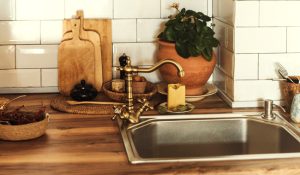
Is It Worth Buying an Expensive Kitchen Faucet?
When you are shopping for a new kitchen faucet, you may come across some pricey options that range between $500 and $1,000, or even more.
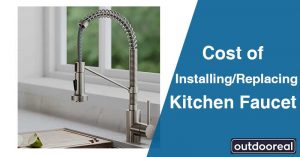
How Much Will It Cost to Install a Kitchen Faucet?
If you’re going to install a new faucet or replace an old one in your kitchen, knowing the average cost of it will help you
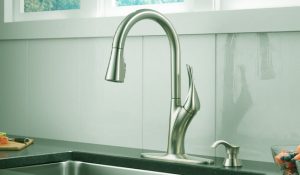
Are Delta Faucets Worth It?
Founded in 1929, Delta Faucet Company is one of the oldest plumbing fixture companies in the world. Though the company primarily serves the North American

The Best 9 Kitchen Faucets Brands Made in USA
Moen, Kohler, and Brizo are the top made-in-America kitchen faucet brands. Here are the top 9 best kitchen faucet brands reviewed with their pros and
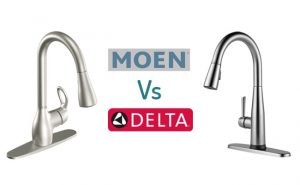
Moen Vs Delta Kitchen Faucet – Head to Head Comparison
When it comes to faucets, there is no doubt that Moen and Delta faucets are at the top of the game. But which one is

Top 10 Kitchen Faucet Brands of 2023
Kitchen remodeling projects have a long list of benefits. For you to reap the full perks of your undertakings, you should purpose to give your




